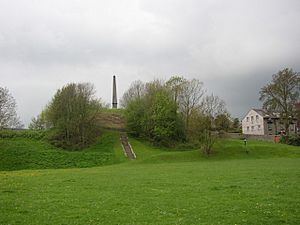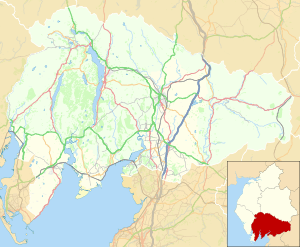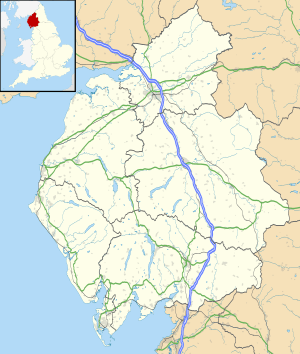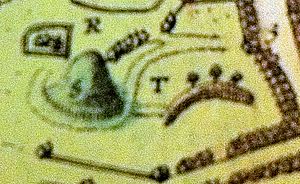Castle Howe facts for kids
Quick facts for kids Castle Howe |
|
|---|---|
| Kendal, Cumbria, England | |

The motte of Castle How
|
|
| Coordinates | 54°19′26″N 2°45′06″W / 54.3239°N 2.7518°W |
| Type | Motte and bailey |
Castle Howe is a special type of old castle called a motte and bailey castle. You can find it in the town of Kendal, which is in England. These castles were very common a long, long time ago.
What is a Motte and Bailey Castle?
A motte and bailey castle was a simple but strong type of castle. It had two main parts. The "motte" was a big, tall mound of earth, often with a wooden tower on top. This tower was a great lookout spot. The "bailey" was a fenced-in area next to the motte. It was usually surrounded by a ditch and a wooden fence. People and animals lived and worked safely inside the bailey.
History of Castle Howe
Castle Howe was built a long time ago, after the Norman conquest of England. This was when William the Conqueror and his Norman army took over England in 1066.
Historians think Castle Howe was built around 1087. One idea is that a Norman nobleman named Ivo Taillebois built it. Another idea is that a nobleman named Ketel built it a bit later, after 1100.
The castle was designed to be a strong defense. The motte was about 11 meters (36 feet) high. It was also very wide at its base, about 48 meters (157 feet) across. The bailey was curved and followed the shape of the ridge next to the motte.
Why Was it Left Behind?
Castle Howe was not used for very long. It was abandoned in the 12th century, which means it was left empty. We don't know exactly why or who left it. It might have been a person named Gilbert, or perhaps William de Lancaster I.
Over time, the bailey part of the castle was destroyed. The land was later turned into a park for people to enjoy.
Today, you can still see the earthworks of the castle. These are the remaining mounds and ditches. The local council, South Lakeland District Council, takes care of them. There are even information boards at the bottom of the motte to help visitors learn more about this historic site.
 | Claudette Colvin |
 | Myrlie Evers-Williams |
 | Alberta Odell Jones |




